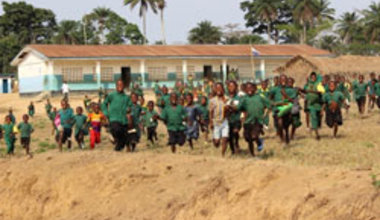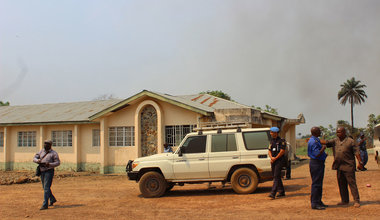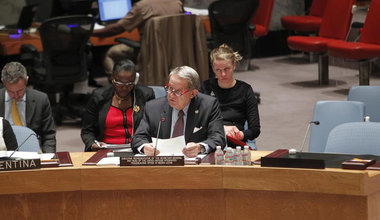Helping Africa's Poor to Manage Risks Key to Region’s Progress, Says New Report
New York, 6 October 2011 - African countries should enhance the strength and resilience of their poor populations through targeted social safeguards, according to "Assessing Progress in Africa toward the Millennium Development Goals (MDGs)", a region-specific report released today. This year's annual report shows that such policies will help in the region's steady progress on some of the MDGs, eight internationally-agreed targets to reduce poverty, hunger, maternal and child deaths, disease, gender inequality and environmental degradation by 2015.
In spite of this progress, recent food, fuel and financial crises, coupled with threats from climate change and the recent instability in North Africa are likely to affect the region's MDG achievement.
"We urge policy-makers to recalibrate their social protection programs, so that they are perceived not as handouts but rather as measures to strengthen productive assets," said the authors of the foreword to the report.
According to the report, national schemes, such as pensions, safety nets and school feeding programmes, can impact positively on several MDGs by addressing the immediate needs of the most vulnerable, providing them with labor market skills and safeguards against relapses into poverty.
The document lays out a number of success stories in the area of policy, including Algeria's social protection scheme that contributed to reducing unemployment from 30 to 10 percent between 2000 and 2009, and Ethiopia's 2005-2008 public works projects that led to construction of nearly 4,500 rural classrooms and improved food security for 7.8 million citizens.
Ghana's National Health Insurance Scheme, covering 67 percent of the population, cut out-of-pocket expenditure for health by 50 percent. In Malawi, agricultural subsidies and outreach services resulted in an increase in the number of food-secure households, from 67 to 99 percent between 2005 and 2009.
Such schemes provide immediate protection for the poor while also making a longer term contribution to creating dynamic economies and more resilient societies, according to the report published by the United Nations Development Programme (UNDP), the UN Economic Commission for Africa (UNECA), the African Development Bank (AfDB) and the African Union Commission (AUC).
Tracking MDGs
Thanks to policy innovations and social protection schemes, Africa has made steady progress on a number of targets. For example, it increased primary school enrolment rates from 65 to 83 percent between 1999 and 2008.
In addition, 80 percent of the 36 African countries that have data for 1990 to 2010 increased the number of women in parliament during that period; and HIV/AIDS prevalence rates have dropped from just under six percent in 2001 to five percent in 2009.
However, while all regions of the world made progress on reducing maternal mortality, Africa faces a formidable task on this indicator, with several countries showing averages of 1,000 deaths per 100,000.
In addition, although the population with access to safe drinking water increased from 56 to 65 percent between 1990 and 2008, the rate of progress is insufficient for the continent to reach the 2015 MDG target of reducing by half the proportion of people without sustainable access to safe drinking water.
Progress on some of the MDGs may have stalled or been reversed by the impact of the global economic crisis on Sub-Saharan Africa where the proportion of those earning less than US$1.25 a day decreased from 67 to 58 percent between 1998 and 2008.
More than 20 percent of young people in North Africa, for example, remained unemployed in 2008, while more than 75 percent of the labor force in Sub-Saharan Africa had vulnerable jobs in 2009.
In addition to carefully targeted and fiscally sound social safeguards, the report says more attention should be focused on designing strategies that promote job-rich growth and increase agricultural productivity.
To access the report, please visit http://www.undp.org/africa/mdg/
***************************
For more information, please contact:
Ethiopia:
UNECA: Yinka Adeyemi, Tel: +251-11-5443537, yadeyemi@uneca.org,
AUC: Noureddine Mezni, Mobile: +251911511723
New York: UNDP, Nicolas Douillet, +1.212.906.5937, nicolas.douillet@undp.org
Tunisia: AfDB, Pénélope Pontet de Fouquières, +216 71 10 12 50, p.pontetdefouquieres@afdb.org
___________________________________________________
UNDP partners with people at all levels of society to help build nations that can withstand crisis, and drive and sustain the kind of growth that improves the quality of life for everyone. On the ground in 177 countries and territories, we offer global perspective and local insight to help empower lives and build resilient nations. Follow us on twitter and facebook.
 UN
UN




